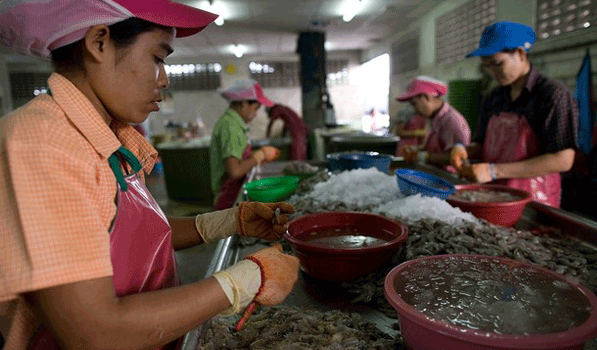Several hundred Burmese migrant workers at a shrimp factory in Thailand are protesting what they say is exploitation by Burmese and Thai employment agencies.
The roughly 500 workers at a factory owned by Thai firm CPF in Rayong Province said they are legally employed under a bilateral agreement between Burma and Thailand, but face exploitation at the hands of unscrupulous agents.
“We have to pay 2,000 to 2,500 baht for rent, but we were promised free accommodation. Plus we have to pay for transport to work,” one of the protesting workers told The Irrawaddy in a phone interview on Thursday.
The workers, who are mostly from Pegu, Irrawaddy and Sagaing divisions, claim since they arrived in Rayong their wages have been cut and passports and work permits confiscated by the agent.
Kyaw Kyaw borrowed money from a loan shark in his village to pay the agent. Now, due to the agent’s behavior, he says he cannot send any money home to his family to pay back the loan.
He came to Thailand last year using the Burmese labor agency Yewunnaka, which finds Burmese migrant workers jobs in Thailand.
“I had to pay 450,000 kyat ($520) in advance for the transportation and service fee before leaving my home,” recalled Kyaw Kyaw, who comes from Yinmarpin Township in Monywa, Sagaing Division.
He says he spent three months waiting in the border town of Myawaddy before the agency found him a job and he crossed into Thailand near Mae Sot, in Tak Province.
“That cost me extra,” he said, adding that the company covered none of his expenses during his trip.
“I have been working here for three months and earn about 300 baht a day, but I didn’t save anything yet,” Soe Min Pai, a worker from Pegu, told The Irrawaddy.
About 60 of the workers had to wait like Kyaw Kyaw in Myawaddy after paying the hefty advance fee.
Upon arrival, the workers say, they had to work without pay for 10 days, and even now they do not receive their full wages.
They have been told by the company they will get their passports and work permits back after two years.
But their protests have won them some small victories.
“As we have protested for a couple of days, the Thai agent, Hta Nah Wat, gave the passports to those workers who made full payments,” Kyaw Kyaw said. In order to get the documents back, the workers must pay 2,000 baht a month for six months to the agent.
But Maung Win, another worker from Monywa, said it took a year for the company to give him back his documents.
The denial of workers’ rights to Burmese migrants is not uncommon in Thailand.

















